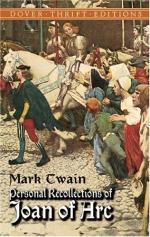The moment Joan was seated on the platform she closed her eyes and allowed her chin to fall; and so sat, with her hands nestling in her lap, indifferent to everything, caring for nothing but rest. And she was so white again—white as alabaster.
How the faces of that packed mass of humanity lighted up with interest, and with what intensity all eyes gazed upon this fragile girl! And how natural it was; for these people realized that at last they were looking upon that person whom they had so long hungered to see; a person whose name and fame filled all Europe, and made all other names and all other renowns insignificant by comparisons; Joan of Arc, the wonder of the time, and destined to be the wonder of all times!
And I could read as by print, in their marveling countenances, the words that were drifting through their minds: “Can it be true, is it believable, that it is this little creature, this girl, this child with the good face, the sweet face, the beautiful face, the dear and bonny face, that has carried fortresses by storm, charged at the head of victorious armies, blown the might of England out of her path with a breath, and fought a long campaign, solitary and alone, against the massed brains and learning of France—and had won it if the fight had been fair!”
Evidently Cauchon had grown afraid of Manchon because of his pretty apparent leanings toward Joan, for another recorder was in the chief place here, which left my master and me nothing to do but sit idle and look on.
Well, I suppose that everything had been done which could be thought of to tire Joan’s body and mind, but it was a mistake; one more device had been invented. This was to preach a long sermon to her in that oppressive heat.
When the preacher began, she cast up one distressed and disappointed look, then dropped her head again. This preacher was Guillaume Erard, an oratorical celebrity. He got his text from the Twelve Lies. He emptied upon Joan al the calumnies in detail that had been bottled up in that mass of venom, and called her all the brutal names that the Twelve were labeled with, working himself into a whirlwind of fury as he went on; but his labors were wasted, she seemed lost in dreams, she made no sign, she did not seem to hear. At last he launched this apostrophe:
“O France, how hast thou been abused! Thou hast always been the home of Christianity; but now, Charles, who calls himself thy King and governor, indorses, like the heretic and schismatic that he is, the words and deeds of a worthless and infamous woman!” Joan raised her head, and her eyes began to burn and flash. The preacher turned to her: “It is to you, Joan, that I speak, and I tell you that your King is schismatic and a heretic!”
Ah, he might abuse her to his heart’s content; she could endure that; but to her dying moment she could never hear in patience a word against that ingrate, that treacherous dog our King, whose proper place was here, at this moment, sword in hand, routing these reptiles and saving this most noble servant that ever King had in this world—and he would have been there if he had not been what I have called him. Joan’s loyal soul was outraged, and she turned upon the preacher and flung out a few words with a spirit which the crowd recognized as being in accordance with the Joan of Arc traditions:




